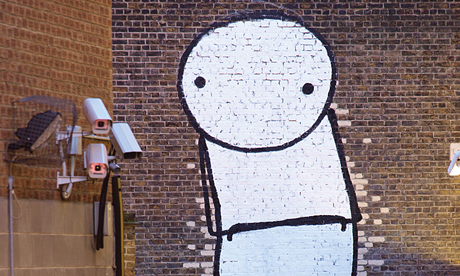Hackney Winter Night Shelter seeks residents’ support

“I left this one behind one behind at St. Mungo’s homeless hostel in Mare Street. He’s looking a bit chilly behind that wall. Might go back and paint him a scarf!” says Hackney artist Stik. Photo: Claude Crommelin
Over the summer, I was at the Stoke Newington Farmers’ Market doing some canvassing for Hackney Winter Night Shelter (HWNS). As I was handing out leaflets, a familiar face came up to me and said: “Hi, how have you been since the winter ended?”
He looked so energised since the last time I’d seen him that it took me a few seconds to realize that he was one of the guests I had served dinner to over the winter of 2011.
I found volunteering over the winter incredibly rewarding. The guests really appreciate the meals and accommodation, and over the weeks you develop a good rapport with individuals. But seeing the former guest at the Farmers’ Market and having him tell me how he was now living in a flat and working part-time was even more rewarding.
A few months later, another former guest came to a volunteer information evening. He also had got his life back on track and wanted to give back to the organisation that had helped him get back on his feet.
This emphasis of putting an end to homelessness is what makes Hackney Winter Night Shelter so effective. It aims to be not only a place where guests can get a meal and a good night’s sleep, but also to break the cycle of homelessness in the borough.
That’s a lofty ambition, particularly in the face of significant cuts to services which serve as a safety net to populations vulnerable to homelessness, including those with mental or physical disabilities and victims of domestic violence.
According to Broadway, a London homelessness charity, homeless rates in the capital rose 8% from 2009/2010 to 2010/2011.
Against these odds, Hackney Winter Night Shelter placed 62 of its 92 guests in long term accommodation by the end of the three month winter shelter.
One of the major reasons it has been able to achieve this tremendous success rate is due to the hiring of a full time link worker.
Previously, the shelter was run completely by volunteers. While the dedication of the 500 plus volunteer force is still integral to the organisation’s success, the link worker helps to unify the shelter’s efforts, as well as focusing on the development of individual guests and helping them break down the barriers to finding accommodation.
Further support comes from the homelessness charity Thames Reach, which sends a support worker each evening to interview guests and to find accommodation for them.
But the problem doesn’t end at finding accommodation. According to HWNS link worker Dafydd Viney: “Many people, especially those who haven’t lived independently before, have problems with bills or with filling out forms, and studies show that 35% of those who have been homeless who move into accommodation will lose that accommodation in the first year.”
That’s why the organisation set up a befriending scheme last year that pairs up volunteers with former guests to provide extra support during the transition into private accommodation.
Viney also warns about the changes to housing benefit which will make many young people especially vulnerable.
“Most people under the age of 35 will no longer be able to claim housing benefit for self-contained flats and many of them will be forced to move out,” he adds.
If homelessness continues to rise the Night Shelter will be under increasing pressure to provide shelter services in Hackney. In 2012 it hopes to open for winter services in November in order to accommodate more guests. It also hopes to expand its venues so that it can accommodate more guests per night during the winter.
Ultimately though, Hackney Winter Night Shelter’s aim is what all charities’ should be: to make themselves obsolete.
With the dedication of volunteers and Dafydd Viney, they are well on their way. But like all local organisations, they need local support in order to thrive.
Christina Chauvenet is a volunteer at Hackney Winter Night Shelter. To find out more about donating money or time go to HWNS.
